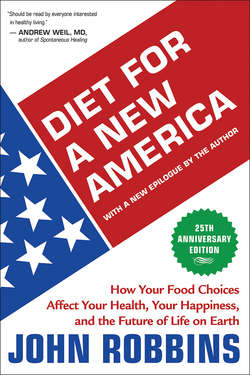Читать книгу Diet for a New America 25th Anniversary Edition - John Robbins - Страница 23
На сайте Литреса книга снята с продажи.
The Easiest Way to Be Wrong Again
ОглавлениеThe conventional assumption of our culture is still that animals do not have any of the higher feelings of which we are capable, such as compassion and love and reverence for life. It can be difficult for us to see how tainted we might be by the culturally sanctioned misunderstanding that animals are only mechanical bundles of instincts and reflexes, with no hearts or souls. Few of us have had the opportunity to learn to respect them for what they are—creatures of marvelous complexity, beauty, and mystery.
The idea of animals as machines without feeling has held sway in the collective psyche for so long that it has acquired a momentum of its own. We have gotten stuck in a very deep mental rut, a habit from which it is not easy to uproot ourselves.
And habit, as Laurence Peter put it, is often “simply the easiest way to be wrong again.”
We have seen this mental habit given credence by the church and philosophical expression through thinkers such as Descartes. To him, the body and soul were completely separate; thinking and feeling were attributes of the soul, not the body, and the body itself was simply a machine.28 Since animals could not speak, it followed for Descartes that they had no soul and so could not feel. According to Descartes’s point of view, which still permeates the psychic atmosphere of our times, all the nonhuman animals, from the ants up to what he called the “ape-machines,” have no capacity for ideas, freedom of action, choice, knowledge of any kind, or feeling. They are merely robots, driven by instincts. He likened animals to watches and clocks, with wheels, springs, gears, and weights. Marvelously contrived though they might be, they are, said Descartes, “mere automatons.”29
Descartes would sometimes kick his dog, just to “hear the machine creak.”
